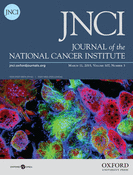
Measuring Disease-Free Survival and Cancer Relapse Using Medicare Claims from CALGB Breast Cancer Trial Participants
Abstract
To determine the accuracy with which Medicare claims data measure disease-free survival in elderly Medicare beneficiaries with cancer, we performed a criterion validation study. We merged gold-standard clinical trial data of 45 elderly patients with node-positive breast cancer who were treated on the Cancer and Leukemia Group B (CAL-GB) adjuvant breast trial 9344 with Centers for Medicare and Medicaid Services (CMS) data files and compared the results of a CMS-based algorithm with the CALGB disease-free survival information to determine sensitivity and specificity. For 5-year disease-free survival, the sensitivity of the CMS-based algorithm was 100% (95% confidence interval [CI] = 81% to 100%), the specificity was 97% (95% CI = 83% to 100%), and the area under the receiver operator curve was 97% (95% CI = 90% to 100%). For 2-year disease-free survival, the test characteristics were less favorable: sensitivity was 83% (95% CI = 36% to 100%), specificity was 95% (95% CI = 83% to 100%), and area under the receiver operator curve was 84% (95% CI = 66% to 100%).
Citation:
E.B. Lamont, J.E. Herndon, J.C. Weeks, I.C. Henderson, C.C. Earle, R.L. Schilsky, and N.A. Christakis, for the Cancer and Leukemia Group B, "Measuring Disease-Free Survival and Cancer Relapse Using Medicare Claims from CALGB Breast Cancer Trial Participants" Journal of the National Cancer Institute, 98(18): 1335-1338 (September 2006)